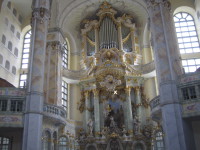After spending 3/4 of a day in Cologne, Germany where we visited The Dome / cathedral, we trained to Berlin. What a pleasant ride — high speed, comfy seats, plenty of leg room…and best of all, no security checks whatsoever. (Side note: Why are we so strict on airline security and do nothing for trains?)
Berlin Day 1 was beautiful! It’s a true big city with some streets bustling with activity, and others right next door harboring urban blight. Some buildings are huge and modern while others are still "Old Country" style, yet to be modernized. This creates an interesting architectural effect; walking the streets of Berlin you have one foot in the 21st C and one foot in the 20th C.

To understand Berlin, I learned, it helps to know your history. I knew no history only 24 hours ago and now feel like I could intelligently converse about Berlin history at a cocktail party, which is the only thing that matters, anyway! The Cold War / Berlin Wall falling / Soviet Union etc etc are all events BEFORE 1988, the year I was born. So for my generation these aren’t in our immediate radar screen. Obviously we talk about them in history textbooks but there’s not that very real texture to them like there is to, say, 9/11, probably the defining historical event of our generation (so far). I’m not good with dates or numbers, so I think about history in broad brushstrokes. As I wandered around Berlin here’s what I kept in mind:
* WW2 – Nazi Germany vs. Allies (U.S./British/Soviet Union).
– We had only aligned with Russia for these brief few years to defeat Nazis, in general we were still wary of communists there
* Allies win
* US/British defeated Germany by closing in from the West, Soviet Union closed in on the East
* They split control of the city (Yalta Conference) among the victors. Soviets controlled East Berlin (and Germany) and the US/British controlled West Berlin.
* Communist rule in East Berlin – people tried to flee; Germans tried to rebel, most failed. Berlin Wall erected at split of the city
* The wall comes down 11/9/1989 with the fall of Communism.
With that history out of the way….We started our day at the Brandenburg Gate, the last remaining monument from the Berlin Wall. It’s OK – definitely nice architecture but not a whole lot to check out. Then I had lunch with Dirk Nolde, business editor of Die Welt newspaper.
We then headed to the Checkpoint Charlie museum, a series of exhibits located right next to the end of the American Sector, and the start of the Soviet Sector (behind the wall). Fascinating stuff. A particular emphasis on the struggles of the German people to keep the City from being divided and the worldwide solidarity with the Berliners in that effort.

Next we trekked to the Judisches Museum Berlin, housed in a massive building designed by American architect Daniel Libeskind. The exhibits and activities were overwhelming — tons of stuff, endless things to do (listen to audio, watch video, etc). It was good not great, I would have liked to have learned more about the state of Jews in Berlin *now*. The best part of the museum though had nothing to do with Jews and everything to do with Sigmund Freud in a special exhibit celebrating Freud’s 150th birthday. Loads of cool stuff: mini-case studies, pictures, and a good refresher on Freud’s theory of psychoanalysis.
At dinner the City of Berlin reaked of honking horns — Germany had just won in the World Cup. The people were going absolutely nuts. Every car honking, people screaming, singing. Ugh. It struck me that there is nothing in the U.S. that rivals the nationalistic pride these countries are showing in the World Cup. Around big events like the Superbowl or World Series there is a lot of city pride, but nothing that spans the whole country.

On Day 2 we visited the Picture Museum of Berlin where there was loads of good Flemish/Dutch art. Visiting the art and listening to the expert self-guided audio tour brought back lots of art history memories and factoids. I’ve always loved the Flemish portraits. We finished our evening at the Berlin Philharmonic hall where a guest choir and ensemble performed Handel’s Messiah.
All in all, Berlin is beautiful cosmopolitan city with kind people, interesting museums, and good visitor/tourist infrastructure. Highly recommended to future Europe tourists.







